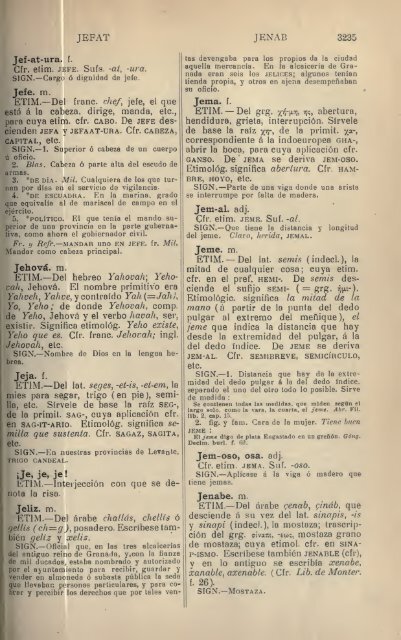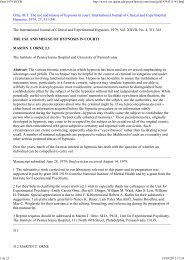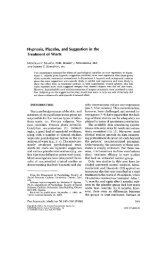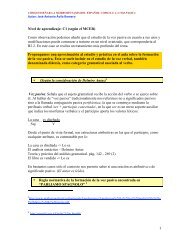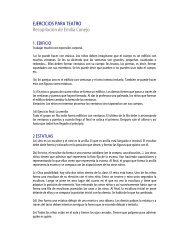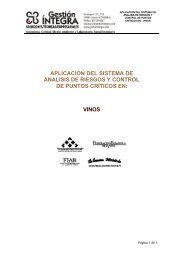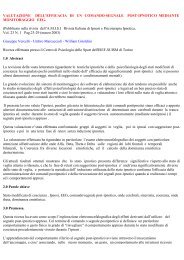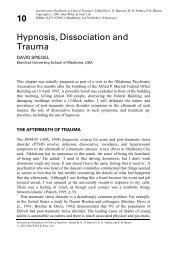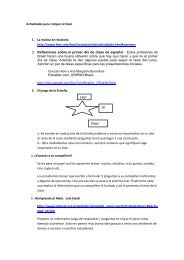Diccionario filológico-comparado de la lengua castellana
Diccionario filológico-comparado de la lengua castellana
Diccionario filológico-comparado de la lengua castellana
Create successful ePaper yourself
Turn your PDF publications into a flip-book with our unique Google optimized e-Paper software.
\ cah^<br />
i<br />
\ Yo,<br />
i <strong>de</strong><br />
! existir.<br />
\ Yeho<br />
Jef-at-ura. f.<br />
JEFAT JENAB 3235<br />
Cfr. elim. jefe. Sufs. -at, -ura.<br />
SIGX.— Cargo ó dignidad <strong>de</strong> jefe.<br />
Jefe. m.<br />
ETIM.— Del franc. che/, jefe, el que<br />
está á <strong>la</strong> cabeza, dirige, manda, etc.,<br />
para cuya etim. cfr. cabo. De jefe <strong>de</strong>scien<strong>de</strong>n<br />
JEFA y JEFAAT-URA. Cfr. CABEZA,<br />
CAPITAL, etc.<br />
SIGN.— 1. Superior ó cabeza <strong>de</strong> un cuerpo<br />
ú oficio.<br />
2. B<strong>la</strong>s. Cabeza ó parte alta <strong>de</strong>l escudo <strong>de</strong><br />
armas.<br />
3. *DE DÍA. Mil. Cualquiera <strong>de</strong> los que turnan<br />
por días en el servicio <strong>de</strong> vigi<strong>la</strong>ncia.<br />
4. ^DE ESCUADRA. En Is marina, grado<br />
que equivalía al <strong>de</strong> mariscal <strong>de</strong> campo en el<br />
ejército.<br />
5. ^POLÍTICO. El que tenía el mando superior<br />
<strong>de</strong> una provincia en <strong>la</strong> parte guberna-<br />
tiva, como ahora el gobiernador civil.<br />
Fr. // Refr.—MASDAR uno en jefe. fr. Mil.<br />
Mandar como cabeza principal.<br />
Jehová. m.<br />
ETIM.—Del hebreo Yahovah; Yeho-<br />
Jehová. El nombre primitivo era<br />
Ya/iveh, Ya/ire, y contraído Yah(=Jah),<br />
Yeho ; <strong>de</strong> don<strong>de</strong> Yehovah, comp.<br />
Yeho, Jehová y el verbo havah, ser,<br />
Significa etimológ. Yeho existe,<br />
que es. Cfr. franc. Jehovah; ingl.<br />
Jehovah, etc.<br />
SIGN.—Nombre <strong>de</strong> Dios en <strong>la</strong> <strong>lengua</strong> hebrea.<br />
J«Ja- f ...<br />
ETIM.—Del <strong>la</strong>t. seges, -et-ts, -et-em, <strong>la</strong><br />
mies para segar, trigo ( en pie }, semi-<br />
l<strong>la</strong>, etc. Sírvele <strong>de</strong> base <strong>la</strong> raíz seg-,<br />
<strong>de</strong> <strong>la</strong> primit. sag-, cuya aplicación cfr.<br />
en SAG-iT-ARio. Etimológ. significa semil<strong>la</strong><br />
que sustenta. Cfr. sagaz, sagita,<br />
etc.<br />
SIGN.—En nuestras provincias <strong>de</strong> Levante,<br />
TRIGO CANDEAL.<br />
Je, je, je!<br />
ETIM.— Inteijección con que se <strong>de</strong>nota<br />
<strong>la</strong> risa.<br />
Jeliz. m.<br />
ETIM.— Del árabe chal<strong>la</strong>s, chellís 6<br />
gellis (ch=g), posa<strong>de</strong>ro. Escríbese tam-<br />
bién geli^ y xeliz.<br />
SIGN.— Oficial que, en <strong>la</strong>s tres alcaicerías<br />
<strong>de</strong>l antiguo reino <strong>de</strong> Granada, y.con <strong>la</strong> fianza<br />
<strong>de</strong> mil ducados, estaba nombrado y autorizado<br />
por el ayuntamiento para recibir, guardar y<br />
tas <strong>de</strong>vengaba para los propios da <strong>la</strong> ciudad<br />
aquel<strong>la</strong> mercancía. En ia alcaicería <strong>de</strong> Granada<br />
eran seis los jelices; algunos tenían<br />
tienda propia, y otros en ajena <strong>de</strong>sempeñaban<br />
su oficio.<br />
Jema. f.<br />
ETIM. — Del grg. xi'V-'^y tt;, abertura,<br />
hendidura, grieta, interrupción. Sírvele<br />
<strong>de</strong> base <strong>la</strong> raíz x^T» <strong>de</strong> <strong>la</strong> primit. ^a-,<br />
correspondiente á <strong>la</strong> indoeuropea gha-,<br />
abrir <strong>la</strong> boca, para cuya aplicación cfr.<br />
ganso. De JEMA se <strong>de</strong>riva jem-oso.<br />
Etimológ. significa abertura. Cfr. hambre,<br />
HOYO, etc.<br />
SIGN.— Parte <strong>de</strong> una viga don<strong>de</strong> una arista<br />
se interrumpe por falta <strong>de</strong> ma<strong>de</strong>ra.<br />
Jem-al. adj.<br />
Cfr. etim. jeme. Suf. -al.<br />
SIGN.— Que tiene <strong>la</strong> distancia y longitud<br />
<strong>de</strong>l jeme. C<strong>la</strong>vo, herida, jemal.<br />
Jeme. m.<br />
ETIM. — Del <strong>la</strong>t. semis (in<strong>de</strong>cl.), <strong>la</strong><br />
mitad <strong>de</strong> cualquier cosa; cuya etim.<br />
cfr. en el pref. hemi-. De semis <strong>de</strong>scien<strong>de</strong><br />
el sufijo SEMI- ( = grg. t,^k-).<br />
Etimológic. significa <strong>la</strong> mitad <strong>de</strong> <strong>la</strong><br />
mano (á partir <strong>de</strong> <strong>la</strong> punta <strong>de</strong>l <strong>de</strong>do<br />
pulgar al extremo <strong>de</strong>l meñique), el<br />
jeme que indica <strong>la</strong> distancia que hay<br />
<strong>de</strong>s<strong>de</strong> <strong>la</strong> extremidad <strong>de</strong>l pulgar, á <strong>la</strong><br />
<strong>de</strong>l <strong>de</strong>do índice. De jeme se <strong>de</strong>riva<br />
JEM-AL. Cfr. semibreve, semicírculo,<br />
etc.<br />
SIGN.— 1. Distancia que hay <strong>de</strong> <strong>la</strong> extremidad<br />
<strong>de</strong>l <strong>de</strong>do pulgar á <strong>la</strong> <strong>de</strong>l <strong>de</strong>do índice,<br />
separado el uno <strong>de</strong>l otro todo lo posible. Sirve<br />
<strong>de</strong> medida :<br />
i<br />
Se i<br />
' <strong>la</strong>rgo<br />
contienen todas <strong>la</strong>s medidas, qne mi<strong>de</strong>n según el<br />
solo, como <strong>la</strong> vara, <strong>la</strong> cuarta, el jeme. Abr. Fil.<br />
lib. 2, cap. 15.<br />
2. fig. y fam. Gara <strong>de</strong> <strong>la</strong> mujer. Tiene buen<br />
JEME :<br />
El Jeme digo <strong>de</strong> p<strong>la</strong>ta Engastado en un greñón. Gong.<br />
Decim. burl. f. 62.<br />
Jem-oso, osa. adj.<br />
Cfr. etim. jema. Suf. -oso.<br />
SIGN.— Aplícase é <strong>la</strong> viga ó ma<strong>de</strong>ro que<br />
tiene jemas.<br />
Jenabe, m.<br />
ETIM.— Del árabe (^enah, Qináb, que<br />
<strong>de</strong>scien<strong>de</strong> á su vez <strong>de</strong>l <strong>la</strong>t. sinapis, -is<br />
¡y sinapi (in<strong>de</strong>cl.), <strong>la</strong> mostaza; trascripción<br />
<strong>de</strong>l grg. (jtvazi, -etüí, mostaza grano<br />
<strong>de</strong> mostaza; cuya etimol. cfr. en sinap-iSMO.<br />
Escríbese también jenable (cfr),<br />
y en lo antiguo se escribía xenabe,<br />
en<strong>de</strong>r en almoneda ó subasta pública <strong>la</strong> seda<br />
xanable, axenable. ( Cfr. Lib. <strong>de</strong> Monter.<br />
que llevaban personas particu<strong>la</strong>res, y para cobrar<br />
y percibir los <strong>de</strong>rechos que por tales ven-<br />
f. 26).<br />
SIGN.—Mostaza.


